Daviel Lazure-Vieira
Over 50% of the global Muslim population lives in the Asia-Pacific region, and with more than 225 million believers, Indonesia has the largest number of Muslims in the world. It’s one of the many things students from the Asian Institute’s Contemporary Asian Studies program learn in a fourth-year undergraduate course focused on different aspects of Indonesian society. Taught by Dylan Clark, the seminar includes a unique International Course Module (ICM) component in Bandung, allowing students to deepen their understanding of Islam, its activities and daily practices in Indonesia. For nine days, students conducted research under the supervision of Jacques Bertrand, a professor of political science and director of the Asian Institute’s Collaborative Master’s Specialization in Contemporary East and Southeast Asian Studies. They visited Islamic boarding schools (called pensantren), and met with students, educators and religious leaders who are deeply committed to education and activism inspired by Islamic values and texts.
“We have seen a rise in misperception regarding Islam,” explains Bertrand. “Reporting on terrorism, ISIS, as well as the deep conflict in the Middle East leaves the impression that radicalism and extremist ideas are the norm within Islam and creates anxiety across many societies, including Canada. While we can certainly try to compensate by inserting more teaching on Islam, its political expression and its diverse forms in our curriculum, the experience of actually engaging directly on the ground provides a unique opportunity to learn multiple facets within a very short time period.”
A sentiment echoed by the students themselves. “I wanted to see the difference between what we learn in class and the actual experiences of people out there in the world – and see whether our academic readings hold true,” says Kana Shishikura, a double-major in Contemporary Asian Studies and Peace, Conflict and Justice Studies at the Munk School.
The trip to Indonesia was one of the many ICMs offered by the Faculty of Arts and Science and the Munk School’s Asian Institute. The goal is to foster cross-cultural, field-based research, while giving students the opportunity to learn more about issues in a different way than what is portrayed in the media. And it’s particularly true when it comes to how Islam is lived and practiced around the world. “The Islamic narrative is usually shaped around the Arab countries of the Middle East. This trip challenged that notion for many of us,” says Aadil Randeree, a fourth-year economics and history student. “Having lived in the UAE for over 12 years, it was interesting for me to see how a majority-Muslim population can take different approaches to implementing Islam in government and society. From education to business, Islamic principles have been incorporated seamlessly into all aspects of Indonesian society.”
The trip was a highlight of both students’ undergraduate studies. “I have always been fascinated by fieldwork and ethnographic research, and this trip made me want to pursue further research beyond my undergraduate degree,” Shishikura explains. In fact, she will soon be travelling to New Delhi and Agra to work on a project funded by the Richard Charles Lee Insights Through Asia Challenge. “I believe that my trip to Indonesia was a great foundation to prepare myself for the research that I will be conducting in India.”
“Seeing the vision and hard work of so many individuals in Indonesia towards social and developmental goals has motivated me to incorporate some aspect of social work in my career,” Randeree says. “Their determination to provide solutions to societal issues and not merely sit idly and wait for the state to intervene was particularly impressive. The personal connection I developed with Indonesia and the people I met will certainly draw me back there and I hope to provide a positive contribution myself, in some form or the other, in the near future.”
March 12, 2018
